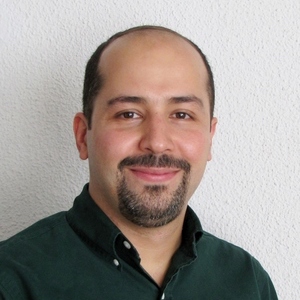
Yasser Riazalhosseini
Assistant Professor, Department of Human Genetics
Email:
Phone: (514) 398-1784
740 Dr Penfield Ave, Room 4203
Montréal, Québec, Canada, H3A 0G1
While collaborating on genome characterization of different tumor entities, research in the lab is focused on following topics:
Comprehensive molecular understanding of renal cell carcinoma
Renal cell carcinoma (RCC) is the most common form of kidney tumors. RCC has different subtypes with clear cell (ccRCC; conventional) being the most frequently diagnosed subtype accounting for 75-80% of RCCs. The incidence of RCC is increasing worldwide, but there is no biological marker for routine clinical use. Furthermore, it is essential to identify novel therapies as RCCs are resistant to conventional chemo- and radio-therapy.
We have recently generated comprehensive genome, epigenome and transcriptome landscapes of ccRCC. In an integrative manner, our lab is dissecting these profiles in order to identify molecular aberrations that possess cancer-driving activities. We have also extended our research to characterize molecular aberrations of other subtypes of RCC including papillary and chromophobe tumors, whose genetic abnormalities are less understood.
Post-transcriptional regulatory programs in cancer
In parallel to analyzing (epi)genome patterns, as factors governing gene expression at transcriptional level, we are investigating role of non-coding transcripts including long non-coding RNAs and microRNAs (miRNAs) as well as RNA binding proteins (RBPs) in post-transcriptional deregulation of cancer transcriptome. Specifically, we combine cancer-associated gene expression patterns with regulatory networks of miRNAs and RBPs, and apply quantitative approaches to these profiles in order to predict factors whose aberrant function can explain the abnormal transcriptome of tumor samples. These potentially “master regulators” are then subjected to experimental verification for their driver activities.
Investigating intra-tumoral heterogeneity and its contribution to metastasis
Approaches to stratifying risk or tailoring therapy for individual cancer patients based on the molecular profile of their tumor biopsy are complicated by the existence of genetic heterogeneity (representing distinct populations of cancer cells with different sets of mutations; subclones) both within and across tumors. Furthermore, across tumor sites, genomes of disseminated cancer cells may have similarities at the onset of metastatic disease, but substantial changes in the genetic composition occur spatially and over time, supporting the suggestion that the expansion of aggressive driver clone(s) and the emergence of relevant subclones correlate with development of incurable disease and potential therapeutic resistance. Our lab has optimized protocols of NGS on minutes amount of DNA as well as on DNA isolated from Formalin-fixed, paraffin-embedded (FFPE) samples providing an opportunity to analyze archived primary tumors of patients affected with metastatic or recurrent disease. We analyze the heterogeneous clonal composition of primary and metastatic tumors in order to investigate genomic evolution of metastasis.
Recent Publications
- Spinelli, C, Adnani, L, Meehan, B, Montermini, L, Huang, S, Kim, M et al.. Mesenchymal glioma stem cells trigger vasectasia-distinct neovascularization process stimulated by extracellular vesicles carrying EGFR. Nat Commun. 2024;15 (1):2865. doi: 10.1038/s41467-024-46597-x. PubMed PMID:38570528 PubMed Central PMC10991552.
- Saatci, O, Alam, R, Huynh-Dam, KT, Isik, A, Uner, M, Belder, N et al.. Targeting LINC00152 activates cAMP/Ca2+/ferroptosis axis and overcomes tamoxifen resistance in ER+ breast cancer. bioRxiv. 2023; :. doi: 10.1101/2023.11.05.565697. PubMed PMID:38496603 PubMed Central PMC10942410.
- Mehvari, S, Karimian Fathi, N, Saki, S, Asadnezhad, M, Arzhangi, S, Ghodratpour, F et al.. Contribution of genetic variants in the development of familial premature coronary artery disease in a cohort of cardiac patients. Clin Genet. 2024; :. doi: 10.1111/cge.14491. PubMed PMID:38308583 .
- Yakneen, S, Waszak, SM, PCAWG Technical Working Group, Gertz, M, Korbel, JO, PCAWG Consortium et al.. Author Correction: Butler enables rapid cloud-based analysis of thousands of human genomes. Nat Biotechnol. 2023;41 (4):577. doi: 10.1038/s41587-022-01554-1. PubMed PMID:36944844 PubMed Central PMC10110458.
- Rodriguez-Martin, B, Alvarez, EG, Baez-Ortega, A, Zamora, J, Supek, F, Demeulemeester, J et al.. Author Correction: Pan-cancer analysis of whole genomes identifies driver rearrangements promoted by LINE-1 retrotransposition. Nat Genet. 2023;55 (6):1080. doi: 10.1038/s41588-023-01319-9. PubMed PMID:36944736 PubMed Central PMC10260396.
- Akdemir, KC, Le, VT, Chandran, S, Li, Y, Verhaak, RG, Beroukhim, R et al.. Author Correction: Disruption of chromatin folding domains by somatic genomic rearrangements in human cancer. Nat Genet. 2023;55 (6):1079. doi: 10.1038/s41588-023-01318-w. PubMed PMID:36944735 PubMed Central PMC10260394.
- Zapatka, M, Borozan, I, Brewer, DS, Iskar, M, Grundhoff, A, Alawi, M et al.. Author Correction: The landscape of viral associations in human cancers. Nat Genet. 2023;55 (6):1077. doi: 10.1038/s41588-023-01316-y. PubMed PMID:36944734 PubMed Central PMC10260395.
- Cortés-Ciriano, I, Lee, JJ, Xi, R, Jain, D, Jung, YL, Yang, L et al.. Author Correction: Comprehensive analysis of chromothripsis in 2,658 human cancers using whole-genome sequencing. Nat Genet. 2023;55 (6):1076. doi: 10.1038/s41588-023-01315-z. PubMed PMID:36944733 PubMed Central PMC10260391.
- Yuan, Y, Ju, YS, Kim, Y, Li, J, Wang, Y, Yoon, CJ et al.. Author Correction: Comprehensive molecular characterization of mitochondrial genomes in human cancers. Nat Genet. 2023;55 (6):1078. doi: 10.1038/s41588-023-01317-x. PubMed PMID:36944732 PubMed Central PMC10260393.
- Vasudev, NS, Scelo, G, Glennon, KI, Wilson, M, Letourneau, L, Eveleigh, R et al.. Application of Genomic Sequencing to Refine Patient Stratification for Adjuvant Therapy in Renal Cell Carcinoma. Clin Cancer Res. 2023;29 (7):1220-1231. doi: 10.1158/1078-0432.CCR-22-1936. PubMed PMID:36815791 PubMed Central PMC10068441.